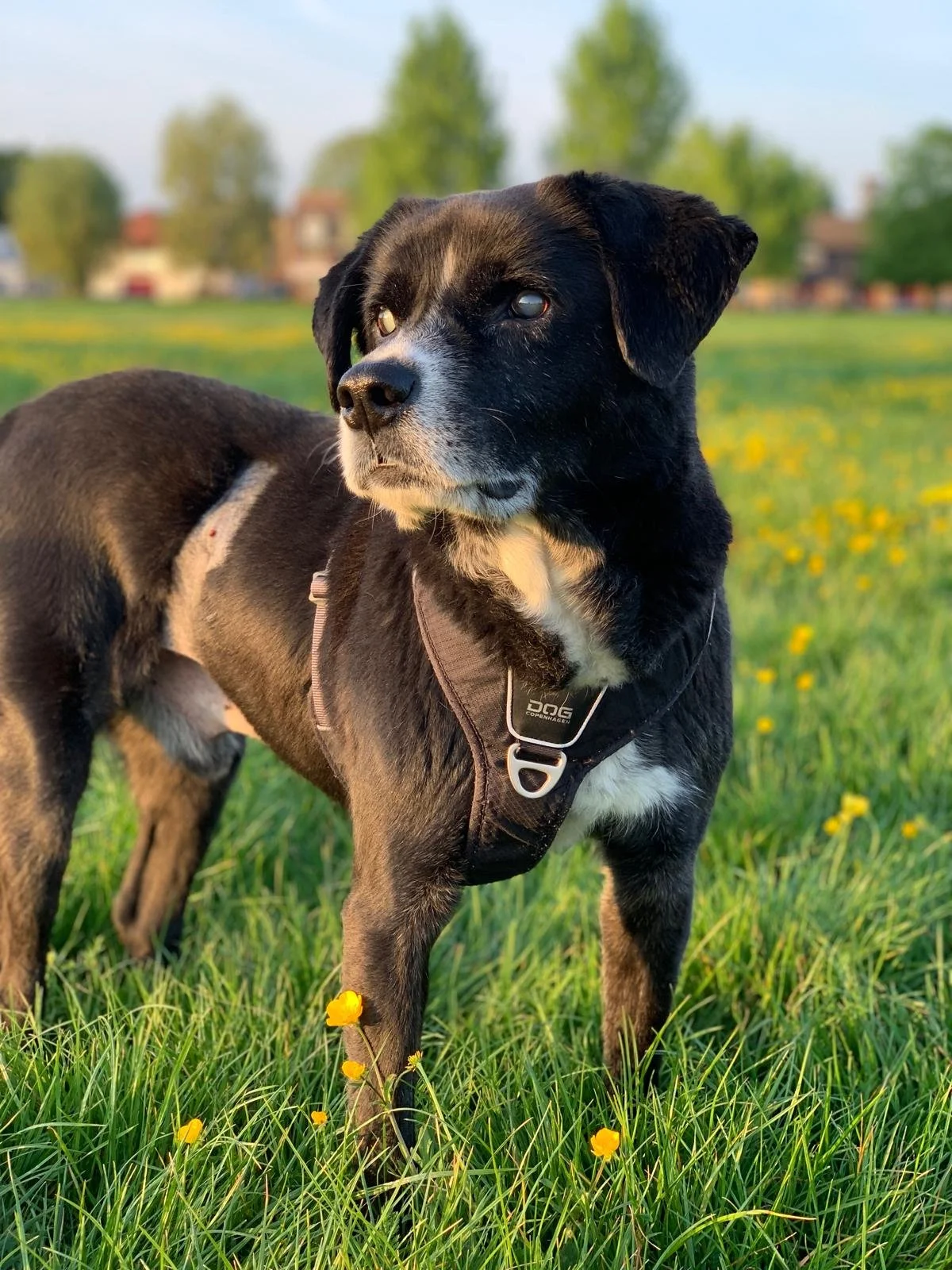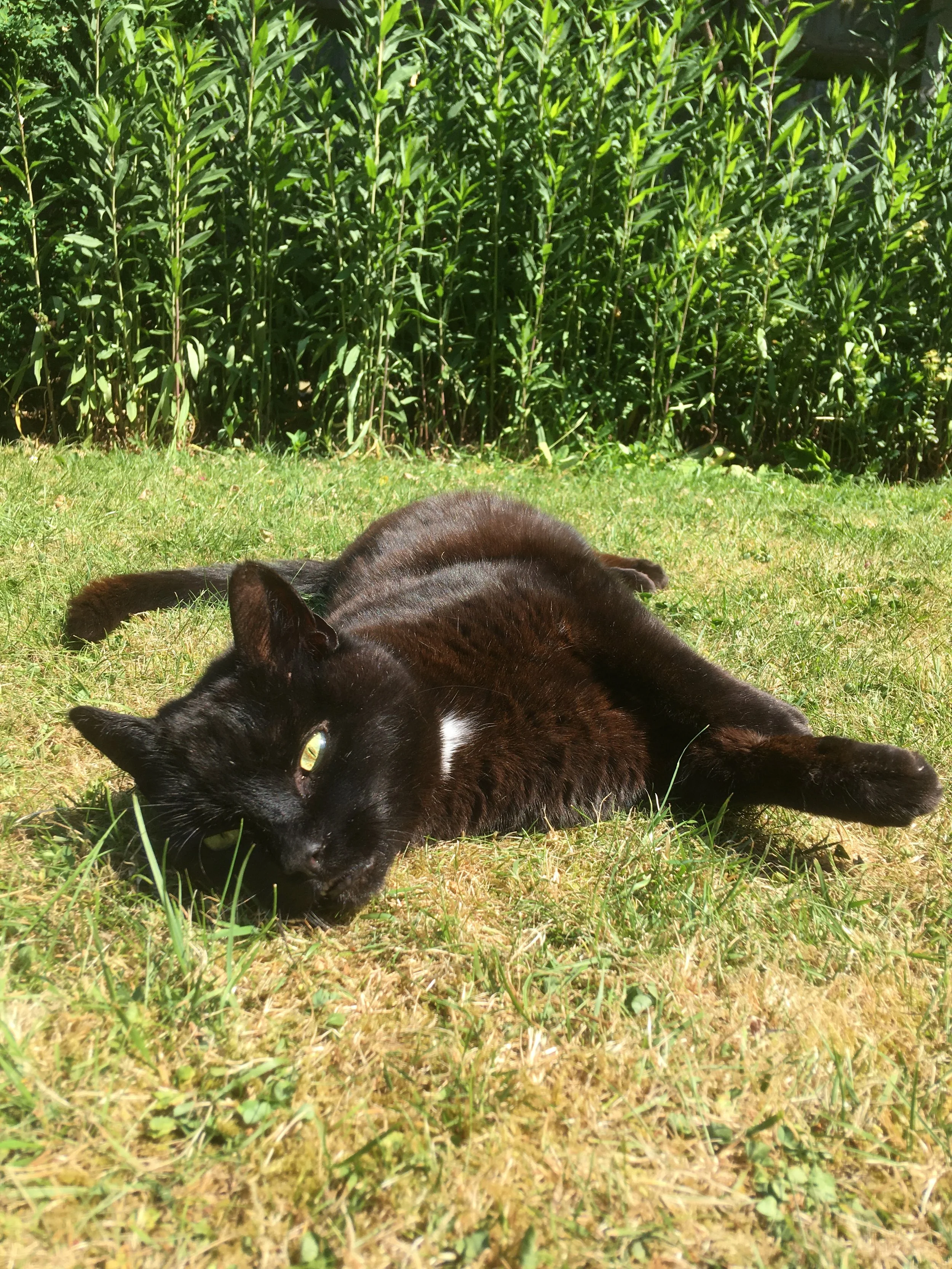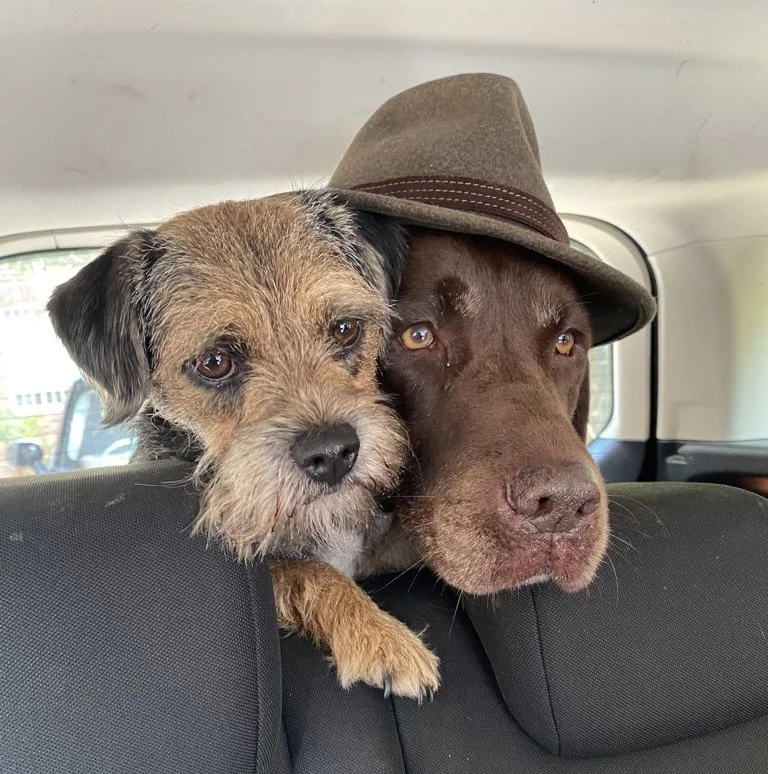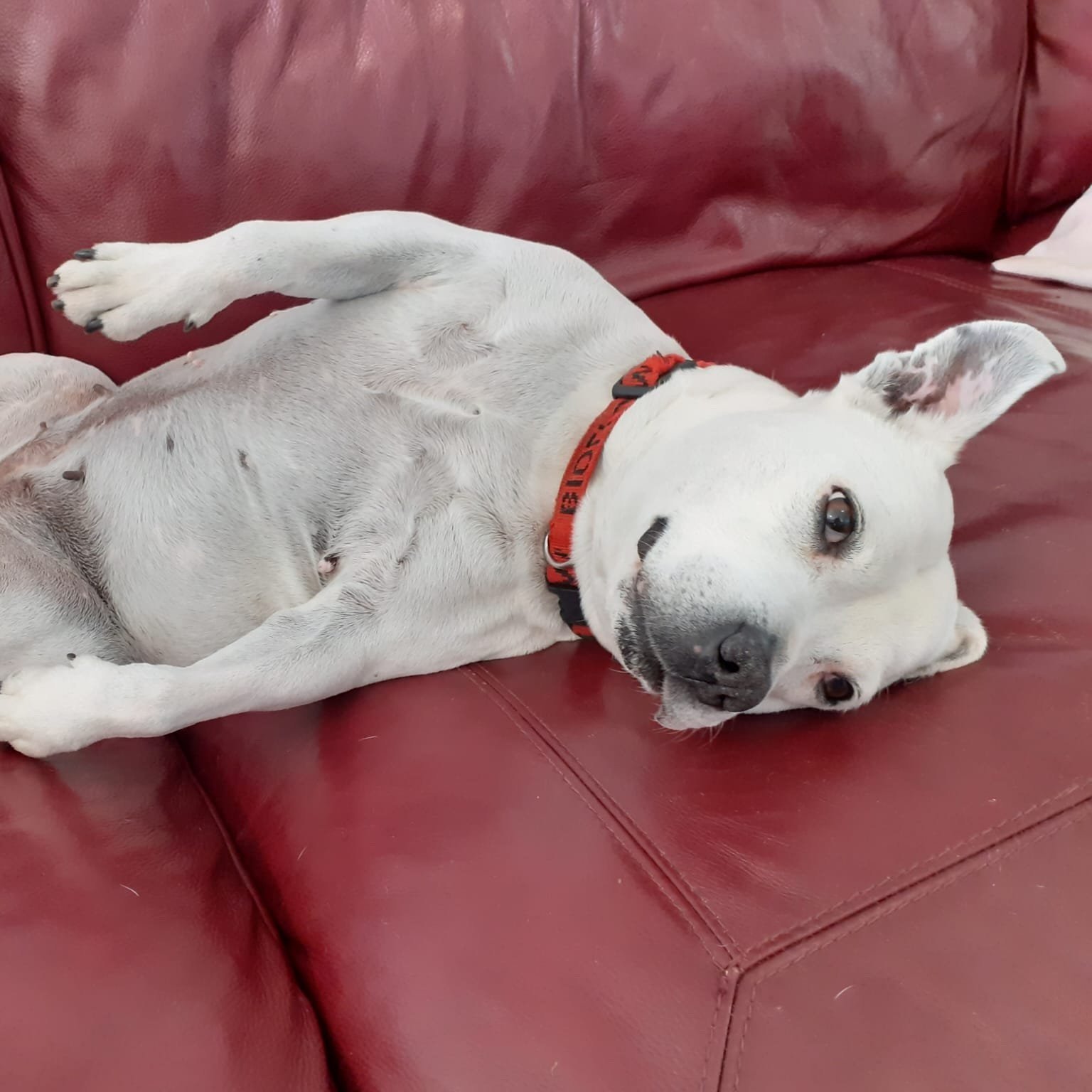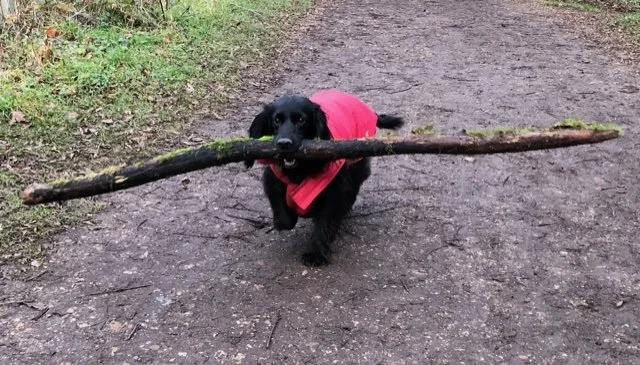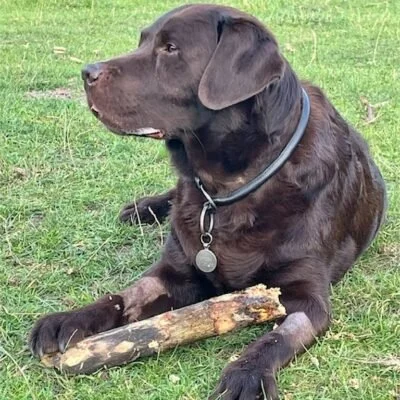
Advice, Articles & News
Pet of the Month
-
![]()
JUNE PET
Jaskier - 9 years oldBREED -Crossbreed
HOW WE HELPED Jaskier was adopted by his owners two years ago after four years with a Polish rescue charity. He was picked up as a stray with significant visual impairment so little is known about his past.
Jaskier is a lovely gentle boy. After so long in a shelter, he is used to his own company, but also loves affection and going for walks, and has adapted really well to family life.
Jaskier gets rather anxious coming to the vets and has had to undergo a lot of treatment in recent months. Our visiting eye specialist David Williams diagnosed retinal degeneration which is sadly untreatable. Jaskier’s owners also noticed blood in his urine and we were concerned about kidney disease or a possible growth in the bladder. Happily, further investigations at the vets school pointed to chronic infections as the cause and Jaskier is responding well to treatment. He has had a lot to contend with in his nine years so we thought he definitely deserved a Pet of the Month accolade!
Congratulations Jaskier!
-
![]()
MAY PET
Jack - 11 years oldBREED -Mixed breed terrier
HOW WE HELPED Jack started life as a Russian street dog. He was rescued by a local charity, came to the UK in 2020 and was adopted by his current owners in 2023.Jack gets in the usual terrier scrapes, such as cuts on his face and paws from too much time investigating Badger sets. He recently gave us a bit of a fright stealing and eating the large cooked bone from the Sunday roast, which fortunately passed through his system without intervention.
Jack is a great character. He is fiercely loyal and completely convinced he is human. He has strong opinions about most things; Jack loves Badger sets, cheese, his owners bed. Jack hates tractors, trains, squirrels horses and cats! He even has his own following on TikTok!
https://www.tiktok.com/@jackiscute19?_t=ZN-8wOohcTvvoE&_r=1
Congratulations Jack!
-
![]()
APRIL PET
Teddy - 7 years oldBREED DLH
HOW WE HELPED Teddy was cared for by the Blue Cross after being abandoned near Elizabeth Way. He was a small scared kitten, but soon came round with lots of love from his new owner. He loves company, and is currently very much missing his companion, Bella, who recently passed away.
Teddy had us all rather worried recently. His owner noticed he was struggling to urinate and further investigation confirmed a blocked urethra and possible kidney disease. Teddy was hospitalised, catheterised and given plenty of fluids. His kidney function improved, but he found the treatment very stressful and stopped eating. Fortunately, a change of pain relief and some appetite stimulants led to an improvement in Teddy’s condition. His owner would have been “heartbroken to have lost him” and is thrilled by his recovery.
Congratulations Teddy!
-
![]()
MARCH PET
Sunny - 13 years oldBREED
Flat-coated RetrieverHOW WE HELPED
Sunny has been through the wars a little in recent years. Now a golden oldie, she suffers from Osteoarthritis and comes in for a monthly injection that reduces joint pain and inflammation. Her condition has also benefitted from laser therapy. She has an ongoing skin condition and has had several surgeries, most recently an oral abscess and before that several growths.Sunny is a much loved member of her family, who despite her arthritis still loves to get out and about. She finds swimming a bit more of challenge these days, but still loves to be near the water. Sunny is a little less keen on visiting the surgery after so much intervention, but remains friendly and cooperative and always brightens our day.
Congratulations Sunny!
-
![]()
FEBRUARY PET
Buster - 8 years oldBREED
RottweilerHOW WE HELPED
Buster has had his fair share of medical challenges. A couple years ago, suddenly lame after chasing a tennis ball, he was diagnosed with a ruptured cruciate ligament, and referred for surgical repair. Shortly afterwards, Buster was attacked by the family cat and developed a particularly nasty infection. Late last year, Buster developed bilateral otitis externa, an inflammatory disease of the external ear canal, which can be very persistent and uncomfortable.Buster’s owner describes him as the friendliest and most social dog you could hope to meet. He is a typical clumsy Rottweiler (weighing 55 kg) who walks through things rather than round them. He loves his daily walks around Milton Country Park, trips to the local pub, play fighting with his owner and sleeps for about 19 hours a day!
-
![]()
JANUARY PET
Luna - 17 years oldBREED
Domestic ShorthairHOW WE HELPED
Luna (short for ‘lunettes’ due to the light fur around both eyes during kittenhood) has only been coming to the surgery for a year or so but we have become rather fond of her. She enjoys human company even more since sadly loosing brother, Enzo, last year. Luna loves snoozing on a lap, surveying the scene from a high vantage point or being involved in whatever is going on, be that sitting on the keyboard, the open book or a drawing in progress!Luna has chronic kidney disease (CKD) which is common in older cats. She also suffers from recurrent urinary tract infections, which after further investigation turned out to be resistant to multiple classes of antibiotics, adding to the difficulty of management. Despite these challenges, Luna is a gentle and patient soul and her owners love her to bits!
-
![]()
DECEMBER PET
Harvey - 15 years oldBREED
LurcherHOW WE HELPED
Rescue dog Harvey was adopted by his current owners (then aged 93) in 2016, after they lost their much loved lab.Harvey settled well, and is great company. He has always loved his walks and food, once managing to almost help himself to the Christmas cake (the sound of the tin hitting the floor gave him away!)
He's now an old boy and spends most of his day dozing on the sofa. Despite his size and his age, Harvey is a really healthy boy, visiting Patrick just twice a year for his checkup. He knows exactly where he is when the car pulls up at the surgery, and tries his very best to drag his owners in the opposite direction. We don’t take it personally!
Congratulations Harvey!
-
NOVEMBER PET
Erskine - 19+ years oldBREED
Domestic ShorthairHOW WE HELPED
Erskine is a venerable cat, over 19 years old, who lives with his sister May.Erskine is a lucky boy, enjoying the peaceful domestic surroundings of the Master’s Lodge at St Catharine’s College, and will always be grateful to Harriet whose deft removal of dental plaque helped reverse a life-threatening infection. Erskine is a gentle, patient and affectionate soul with a love of food and nature and an adventurous and curious spirit that has made him beloved and cherished by all who have met him.
We are all very happy that Erskine continues to enjoy good health and a fantastic quality of life!
-
![]()
OCTOBER PET
Bessie - 13 years oldBREED
Basset HoundHOW WE HELPED
Bessie was adopted aged 8 months old from Battersea Dogs and Cats Home. Bessie is all about food and cuddles! She has never been interested in toys but does love a pizza crust, cucumber or carrots. She's the best therapy dog, loves a Sunday sofa nap and is amazing with children. She's surprisingly speedy for her little legs and enjoys her regular trips to Scotland where she hangs out with the family Italian Spinone.Bessie has been a regular visitor to the practice over the years, including an allergic reaction to a spider, emergency treatment after eating a whole punnet of grapes and in more recent years ongoing treatment to manage her allergic skin disease, heart condition and age related incontinence. Bessie puts up with all these tribulations with great stoicism. Harriet is her favourite (sorry Patrick!) and she has lots of love for Anna and Nancy and the rest of the team too.
-
![]()
SEPTEMBER PET
Kiki - 1 years oldBREED
Domestic Short HairHOW WE HELPED
Lovely Kiki has just celebrated her first birthday. Kiki and her siblings were born at Woodgreen Animal Shelter. She was the smallest of the litter but has grown into a lovely, friendly family cat who adores people and purrs whenever anyone comes in the room! Happily, she has not required much veterinary attention so far other than routine vaccinations, anti-parasite treatment and neutering aged 6 months, which is great news for Kiki but means we don't see quite as much of her as we would like! Congratulations Kiki. -
![]()
AUGUST PET
Pork Chop - 14 years oldBREED
ChihuahuaHOW WE HELPED
You may have seen Pork Chop snoozing at reception. Pork Chop has required a lot of veterinary attention since coming to live with Anna. When she first arrived lots of her teeth were missing and others were in poor condition, requiring significant dental work including multiple extractions. She has allergic skin disease which flares up at certain times of the year and requires ongoing medication and regular ear cleaning and treatment. Pork Chop also has mild mitral valve disease, which for now just needs monitoring, and a rare congenital cerebral defect called focal porencephaly, which causes periodic cluster seizures.Despite this extensive medical history Pork Chop is a sweet old lady who enjoys coming to work with Anna, watching the other pets from the safety of her wine box on the reception desk.
-
![July Pet]()
JULY PET
Moon - 5 years oldBREED
German ShepherdHOW WE HELPED
Moon has been visiting the surgery since she was a young pup. Moon was diagnosed with dietary sensitivity around the age of two, suffering recurrent bouts of diarrhoea. It has taken time and a lot of owner dedication to get her condition under control, but she is now fairly well maintained on a prescription diet with the addition of daily probiotics.We are very fond of Moon here at the surgery, but sadly the feeling is not mutual! Moon doesn’t enjoy visiting the surgery, so we keep visits to a minimum and sometimes see her outside, where she is more comfortable. We also ensure we have extra time when she visits so we can take things slowly and try and build up trust.
-
![]()
JUNE PET
Pickle - 6 years oldBREED
Domestic Long HairHOW WE HELPED
Pickle came to us at the start of March for a second opinion on a swelling in the lower joint of his right front leg. Further diagnostic tests ruled out infection and X-rays showed slight displacement of the bones in the lower leg. Biopsy results were suggestive of a Spindle Cell Tumour, a type of neoplasia which tends to be invasive and difficult to remove and the difficult decision was made to amputate poor Pickle's leg.Pickle is making a fantastic recovery. He is adapting well to life on three legs and has received fantastic care from his owners, who are very happy to see him bounce back so successfully from the surgery and are becoming quite fond of the distinctive noise he makes hopping up and down the stairs on three legs.
Congratulations Pickle!
-
![]()
MAY PET
Tiggi - 18 years oldBREED Lurcher
HOW WE HELPED
At seventeen and a half years old, Tiggi is one of our oldest patients and we are proud to have been treating her here at the clinic for her whole life. Overall Tiggi’s health has been good. She was diagnosed with kidney failure a few years ago but responded well to a change in diet. More recently she started having monthly injections to help with pain and stiffness in her joints. Tiggi is lucky to have very committed owners, and a combination of a good constitution, great care and a little bit of luck. She continues to have a very good quality of life, and loves going for walks to see all of her friends.We do love a golden oldie here at the surgery and have really enjoyed getting to know Tiggi over the years (even if the feeling is not reciprocated!)
-
![]()
APRIL PET
Rodney, 13 years oldBREED
Shih tzu
HOW WE HELPED
Rodney may be small, but he is a big character, ruling the roost at home, and making sure that everyone in the family knows he’s boss. He doesn’t like other dogs and is rather picky about his food.He does however like his daily walk, which he continues to enjoy despite a few recent health problems. He has struggled in the past with skin problems, and over the past few years the development of a heart murmur and possible arthritis. Most recently, Rodney has been treated for an ulcer in his right eye. He is just about tolerating treatment.
A visit from Rodney always makes us smile so we thought he deserved a month in the limelight. Congratulations Rodney!
Longer Reads
We appreciate that some aspects of pet care can be quite complex so have compiled a few longer reads to provide you with more detailed information and advice.
Gone but not forgotten
The saddest part of our job is saying goodbye, and we often receive lovely photos of pets who are no longer with us.If you would like to send a photo or memory of companion we would love to help their memory live on.
-
![]()
Oki 07.06.24
-
![]()
Kilo 21.03.24
-
![]()
Pepsi 04.06.24
-
![]()
Poppy 2014
-
![]()
George 07.06.24
-
![]()
Saxon 17.08.24
-
![]()
Buster 03.02.24
-
![]()
Dylan 11.06.24
-
![]()
Kaspar 08.04.24
-
![]()
Kitty 05.24
-
![]()
Leo 01.02.24
-
![]()
Oso 31.08.23
-
![]()
Poppy 21.12.19








